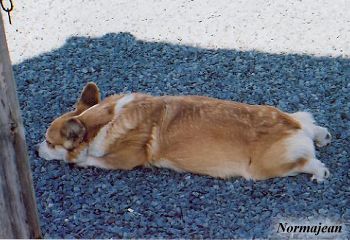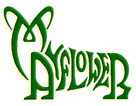Announcing the NEW GENETIC TEST FOR DM NOW AVAILABLE
Canine Health Foundation June, 2008

Canine Degenerative Myelopathy (DM) is an adult-onset, progressive spinal cord disease causing weakness in the hind limbs and eventually paraplegia. Dog owners usually elect euthanasia within a year of diagnosis; however, when euthanasia is delayed flaccid paralysis and widespread loss of muscle mass occur. Because common acquired compressive spinal cord diseases can mimic DM, a definitive diagnosis currently can only be accomplished postmortem by histopathologic observation of the spinal cord.
Drs. Gary Johnson and Joan Coates at the Animal Molecular Genetics Laboratory of the University of Missouri and Drs. Claire Wade and Kerstin Lindblad-Toh at the Broad Institute of MIT/Harvard and their colleagues have identified a DNA mutation that is a major risk factor for development of degenerative myelopathy in dogs. The research project was funded by the AKC Canine Health Foundation, American Boxer Charitable Foundation, Pembroke Welsh Corgi Club of America, Rhodesian Ridgeback Club of the United States, French Bulldog Club of America, and French Bulldog Rescue League.
A DNA test will soon be available for breeders and pet owners, along with information about what the test can and cannot tell them. The test clearly identifies dogs that are clear (have 2 normal copies of the gene), those who are carriers (have one normal copy of the gene and one mutated copy of the gene), and those who are at much higher risk for developing DM (have 2 mutated copies of the gene). However, having two mutated copies of the gene does not necessarily result in disease.
Dogs that have clinical signs or a presumptive diagnosis of DM have tested as genetically affected. A relatively high percentage of dogs in several breeds (including Boxers, Pembroke Welsh Corgis, Chesapeake Bay Retrievers and Rhodesian Ridgebacks) have the predisposing mutation. It is important to note that there are a large number of dogs that have tested as genetically affected, but are reported as clinically normal by their owners. It may be that many of these dogs will develop clinical signs as they get older or that the mutation will never manifest in these dogs. Research is still needed to determine the frequency of the mutation in breeds known to have DM (German Shepherd Dogs, Rhodesian Ridgebacks, Pembroke and Cardigan Welsh Corgis, Boxers, Chesapeake Bay Retrievers). In the future, we may identify other risk factors in those dogs that have tested as genetically affected. Wise use of this test can reduce the incidence of dogs at risk for DM in the long-term, particularly if other low frequency risk factors are identified that can more easily be reduced. It is likely to take many generations to reduce the frequency of this disease in breeds with higher frequency of the mutation. By contributing blood samples for testing this mutation, owners will facilitate further study of the disease and the genetic risk factors underlying it.
Additional research funded by participating breed clubs and the AKC Canine Health Foundation will help answer questions that remain. Information about the benefits of this test, testing forms and instructions, and suggestions for using the test to reduce the frequency of DM will soon be available online in the DM section of www.CanineGeneticDiseases.net.
Related URL: http://www.offa.org/dnatesting/
Drs. Gary Johnson and Joan Coates at the Animal Molecular Genetics Laboratory of the University of Missouri and Drs. Claire Wade and Kerstin Lindblad-Toh at the Broad Institute of MIT/Harvard and their colleagues have identified a DNA mutation that is a major risk factor for development of degenerative myelopathy in dogs. The research project was funded by the AKC Canine Health Foundation, American Boxer Charitable Foundation, Pembroke Welsh Corgi Club of America, Rhodesian Ridgeback Club of the United States, French Bulldog Club of America, and French Bulldog Rescue League.
A DNA test will soon be available for breeders and pet owners, along with information about what the test can and cannot tell them. The test clearly identifies dogs that are clear (have 2 normal copies of the gene), those who are carriers (have one normal copy of the gene and one mutated copy of the gene), and those who are at much higher risk for developing DM (have 2 mutated copies of the gene). However, having two mutated copies of the gene does not necessarily result in disease.
Dogs that have clinical signs or a presumptive diagnosis of DM have tested as genetically affected. A relatively high percentage of dogs in several breeds (including Boxers, Pembroke Welsh Corgis, Chesapeake Bay Retrievers and Rhodesian Ridgebacks) have the predisposing mutation. It is important to note that there are a large number of dogs that have tested as genetically affected, but are reported as clinically normal by their owners. It may be that many of these dogs will develop clinical signs as they get older or that the mutation will never manifest in these dogs. Research is still needed to determine the frequency of the mutation in breeds known to have DM (German Shepherd Dogs, Rhodesian Ridgebacks, Pembroke and Cardigan Welsh Corgis, Boxers, Chesapeake Bay Retrievers). In the future, we may identify other risk factors in those dogs that have tested as genetically affected. Wise use of this test can reduce the incidence of dogs at risk for DM in the long-term, particularly if other low frequency risk factors are identified that can more easily be reduced. It is likely to take many generations to reduce the frequency of this disease in breeds with higher frequency of the mutation. By contributing blood samples for testing this mutation, owners will facilitate further study of the disease and the genetic risk factors underlying it.
Additional research funded by participating breed clubs and the AKC Canine Health Foundation will help answer questions that remain. Information about the benefits of this test, testing forms and instructions, and suggestions for using the test to reduce the frequency of DM will soon be available online in the DM section of www.CanineGeneticDiseases.net.
Related URL: http://www.offa.org/dnatesting/
Article Posted: Archive post from old website - posted to new website April 2015
|
© 2021 Mayflower Pembroke Welsh Corgi Club, Inc.
All rights reserved. |




